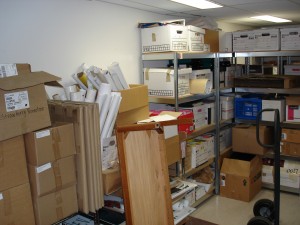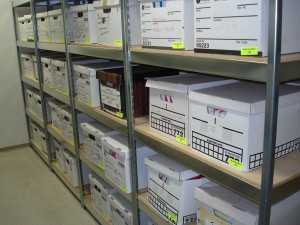
The Storage Room Before
Do you know what your retention policies are for documents and electronic files for your business? Knowing what you are required to keep for income tax purposes is critical to your records management system for your business.
One of the main reasons people keep all their papers and electronic files is they are not sure what the CRA policy is or their own company policy is on recording keeping. Canada Revenue Agency has specific guidelines for what records you need to keep for tax purposes. Canada Revenue Agency has a record keeping document that I recommend you read for your own peace of mind and to determine your business retention policies at http://www.cra-arc.gc.ca/E/pub/tg/rc4409/rc4409-11e.pdf.
This document (in part) covers recording keeping matters such as:
Why you should keep complete and organized records:
- Requirements for records
- Your responsibilities for record keeping
- Where to keep your records
- How long do you need to keep your records
- Destroying records early
- Keeping Electronic Records
- E-commerce
- Requirements for electronic record keeping including:
- Doing business on the Internet
- Backing up electronic files
- Managing electronic records and images
- Where to keep your electronic records
- Payroll Records
- GST/HST
- and other important information
Make sure you bookmark this page for CRA http://www.cra-arc.gc.ca
How long to keep your records
As a general rule, you must keep all of the records and supporting documents that are required to determine your tax obligations and entitlements for a period of six years from the end of the last tax year to which they relate.
The six-year retention period under the ITA begins at the end of the tax year to which the records relate. The tax year is the fiscal period for corporations and the calendar year for all other taxpayers. The rules are similar for GST/HST under the ETA, as well as for the EIA, the CPP, the EA 2001, and the ATSCA.
Records and supporting documents concerning long-term acquisitions and disposal of property, the share registry, and other historical information that would have an impact upon sale or liquidation or wind-up of the business must be kept indefinitely.
Note: The CRA may specifically require you to keep records for an additional period of time. If this is the case, you will receive details by registered letter or by a demand served personally by CRA officials.
The following are special situations:
- If you file an income tax return late, keep your records for six years from the date you file the return.
- Keep all your records necessary for dealing with a notice of objection or appeal until the notice of objection or appeal is disposed of and the time for filing any further appeal has expired, or until the six-year period mentioned above has expired, whichever is later.
- When a non-incorporated business or other organization ends, the records have to be kept for six years from the end of the tax year in which it ceased to exist.
- When a corporation is dissolved, the following records have to be kept for two years after the date of dissolution:
- All records and supporting documents to verify the tax obligations and entitlements;
- All the additional records that corporations have to keep, as listed above.
- When a corporation amalgamates or merges, business records must be retained as if the new corporation is a continuation of each of the original corporations.
- The legal representative of a deceased taxpayer or trust can destroy the records after receiving a clearance certificate(s) to distribute any property under his/her control.
Note: To request a clearance certificate, complete Form TX19, Asking for a Clearance Certificate, and send it to your tax services office.
Electronic record keeping
Keeping electronic records means using electronic business systems to create, process, store, maintain, and provide access to the financial records of a person.
These systems include, but are not limited to:
- Custom and commercial accounting software;
- Point of sale systems;
- Internet based electronic commerce (e-commerce) systems;
- Electronic purchasing and restocking systems; and
- Income tax and GST/HST returns preparation software.
Doing business on the Internet
If you use the Internet to carry on your business, your requirements and responsibilities are the same as those of regular businesses or other organizations as listed in Chapters 1 and 2 of the CRA document. In addition, you are responsible for retaining additional information generated by Internet-based transactions. This information forms an important part of the audit trail and is relevant for tax purposes.
Business systems evaluation: The CRA may undertake a review of your business systems to:
- ensure the systems meet the CRA record keeping requirements outlined earlier
- get an overview of the system; this includes configuration options and details of the flow of information through the system and subsystems
- evaluate the retention and content of electronic data files
Why should you keep complete and organized records?
You are required by law
You are required to keep complete and organized records as stated in the:
- Income Tax Act (ITA);
- Excise Tax Act (ETA);
- Excise Act, 2001 (EA 2001);
- Canada Pension Plan (CPP);
- Employment Insurance Act (EIA);
- Air Travellers Security Charge Act (ATSCA); and
- Softwood Lumber Products Export Charge Act, 2006 (SLPECA).
For further information go to www.cra.gc.ca/bt/fq-eng.html
There are benefits for you

The After Storage Room
Complete and organized records will:
- help you identify the sources of your income;
- remind you of expenses you can deduct and tax credits you can claim;
- make it easier for you to determine your taxes owing;
- provide you with information on the past and present financial positions of your business or other organization;
- help you make good business decisions;
- assist you in getting loans from banks and other lenders;
- help to prevent problems if we audit your returns; and
- possibly help you in selling your business or bringing in new partners.
Consequences of not keeping adequate records
We may disallow expenses that you are unable to support.
Also, there are penalties if you:
- do not keep adequate records;
- do not provide CRA officials with access to your records, when requested; or
- do not give information to CRA officials, when asked.
See Information Circular IC78-10, Books and Records Retention/Destruction, and GST/HST Memorandum 15.1, General Requirements for Books and Records, for more information on possible penalties and legal action.
How much time and space are you wasting looking for documents?
Let’s face it, records management can be a big job! Not sure where to begin? I’m here to help you. Keeping your records and storage room is easy with the Paper Tiger Filing System and you’ll be able to find what you need when you need it! I’m ready when you are.
 Sometimes paper piles up all over the kitchen counters and the top of the desk. Have you every found yourself in a panic searching for your hotel or flight information at the last minute? You know it is there somewhere in the piles of paper but where is it?
Sometimes paper piles up all over the kitchen counters and the top of the desk. Have you every found yourself in a panic searching for your hotel or flight information at the last minute? You know it is there somewhere in the piles of paper but where is it?

